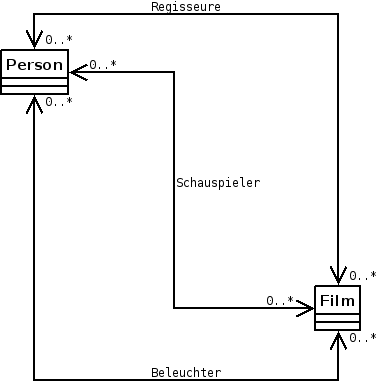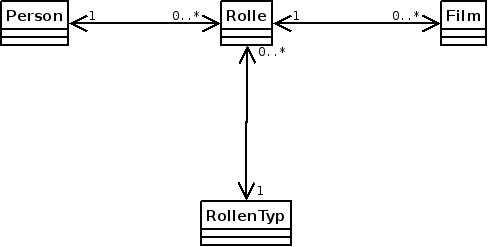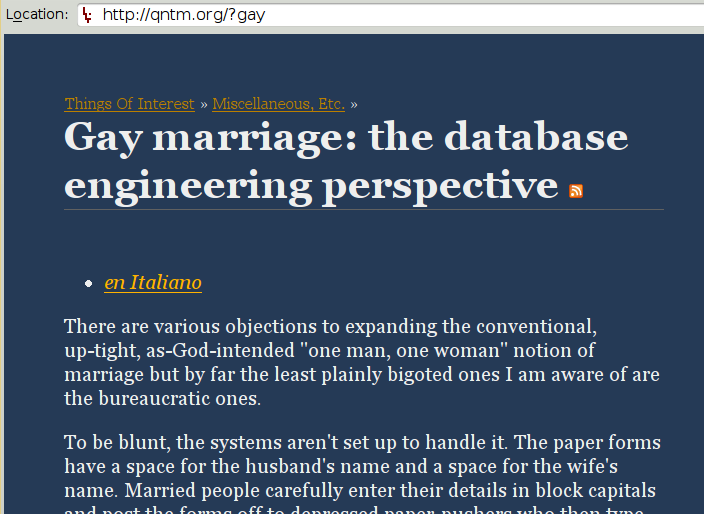Creative Associations
Relationships and Marriage Problems
Michael Schürig
Many Relationsships

- Each relationship is represented by its own join table.
- For each new relationship code and database have to be changed.
-
Tough questions
- Who participated in this movie?
- Which movies did this person participate in?
One Relationship: On the Role

- Ternary association: person, movie, type
-
Somer queries become more complicated:
- Who's the director of this movie?
-
Some become easier:
- Who participated in this movie?
Marital Symmetry
I am married to you
⇔ You are married to me
- Example of symmetric relationship.
- Serial monogamy: The association is tied to a period of time.
Acting
class Movie < ActiveRecord::Base has_and_belongs_to_many :actors, :class_name => 'Person' # ... same for director, camera, cutter, makeup, ... endThat's not the way..
- Directors Guild of America: one director rule Wikipedia/DGA.
Roles to the Rescue!
class Movie < ActiveRecord::Base
has_many :roles
has_many :participants, :through => :roles,
:source => :person
end
class Role < ActiveRecord::Base
validates_presence_of :role_type
belongs_to :person
belongs_to :movie
end
How do I get a Role?
movie.participants.find(:all, :conditions => ...)That hurts!
Extended Associations
class Movie < ActiveRecord::Base
has_many :roles do
def as_actor
self.scoped(
:joins => 'CROSS JOIN roles',
:conditions => { :roles => { :role_type => "actor" } }
)
end
def as_director
...
end
end
has_many :participants, :through => :roles,
:source => :person do
...
end
end
- Who am I?
- self
- AssociationProxy, behaves almost like the target object.
- proxy_owner
- Returns the object the association is part of.
- proxy_reflection
- Returns the reflection object that describes the association.
- proxy_target
- Returns the associated object for belongs_to and has_one, or the collection of associated objects for has_many and has_and_belongs_to_many.
Am I Repeating Myself?
YES!
Dynamically Talking Less...
class Movie < ActiveRecord::Base
has_many :roles do
def as(role_type)
self.scoped(
:joins => 'CROSS JOIN roles',
:conditions => { :roles => { :role_type => role_type }}
)
end
end
end
...While Telling Everything
class Movie < ActiveRecord::Base
has_many :roles do
def as(role_type)
...
end
[:actor, :director].each do |role_type|
define_method("as_#{role_type}") do
as(role_type)
end
end
end
end
- Where do the types come from?
Roles, Actors, Directors
Don't miss them:
class Movie < ActiveRecord::Base
has_many :roles do
...
end
has_many :participants, :through => :roles,
:source => :person do
def as(role_type)
...
end
[:actor, :director].each do |role_type|
define_method ...
end
end
end
Is this necessary?
Drought
No.
class Movie < ActiveRecord::Base
has_many :roles, :extend => RoleTypeExtension
has_many :participants, :through => :roles,
:source => :person,
:extend => RoleTypeExtension
end
module RoleTypeExtension
def as(role_type)
...
end
[:actor, :director].each do |role_type|
define_method ...
end
end
- Associations can be extended through modules.
- Even better, if these extensions fit in multiple places.
Serendipity
class Person < ActiveRecord::Base
has_many :roles, :extend => RoleTypeExtension
has_many :movies, :through => :roles,
:extend => RoleTypeExtension
end
Restricted Groups
class Person < ActiveRecord::Base
named_scope :actors, {
:joins =>
'INNER JOIN roles ON roles.person_id = people.id',
:conditions => { :roles => { :role_type => 'actor' }
}
end
- We have ways to find actors, directors for a specificmovie. How do we find them all?
- Taking a step back, there's more than associations.
- But there's repetition lurking again.
Dynamic Groups
class Person < ActiveRecord::Base
['actor', 'director'] do |role_type|
named_scope role_type.pluralize,
{
:joins =>
'INNER JOIN roles ON roles.person_id = people.id',
:conditions => { :roles => { :role_type => role_type }
}
end
end
end
Oops, we did it again
['actor', 'director'] do |role_type|
Everything in its Place
class Role < ActiveRecord::Base
ROLE_TYPES = %w(actor director).freeze
def self.each_role_type(&block)
ROLE_TYPES.each(&block)
end
end
class Person < ActiveRecord::Base
Role.each_role_type do |role_type|
named_scope role_type.pluralize,
...
Only Looking?
movie.participants.add(... ? ...) movie.participants.remove(... ? ...)
- So far we can only browse existing relationships.
- We can't add or remove objects.
Give and Take (1)
class Movie < ActiveRecord::Base
has_many :roles, :extend => RoleTypeExtension
has_many :participants, :through => :roles,
:source => :person, :extend => ParticipantsExtension
module ParticipantsExtension
include RoleTypeExtension
...
end
end
module RoleTypeExtension
...
end
Give and Take (2)
module ParticipantsExtension
include RoleTypeExtension
def add(role_type, person)
proxy_owner.roles.build(
:person => person,
:role_type => role_type)
end
def remove(role_type, person)
role = Role.find(:first,
:joins => :roles,
:conditions => {
:person_id => person,
:movie_id => proxy_owner,
:role_type => role_type })
proxy_owner.roles.delete(role)
end
end
- Treachery: Changes to associations aren't immediately visible on all associated objects.
A Visit to the Control Room
class MoviesController < ApplicationController
def create
@movie = Movie.new(params[:movie])
respond_to do |format|
...
end
end
def update
@movie = Movie.find(params[:id])
@movie.update_attributes(params[:movie])
respond_to do |format|
...
end
end
end
- When creating a new movie we'd like to assign actors and director at the same time. Similarly, when updating a movie.
- "Participation" in a movie is not a resource of its own.
- Movies and their attaches participations are an aggregate with the movie as the root.
Always at Your Service
What the client sends:
{
"id" => 4217,
"movie" => {
"title" => "Tramping Along the Rails",
"actor_ids" => ["1", "2", "3", "5", "8"],
"director_ids" => ["13"]
}
}
Complicated Customer
A request with extras:
{
"id" => 4217,
"movie" => {
"title" => "Tramping Along the Rails",
"actors" => [
{ "person_id" => "1", "credited_as" => "Will Shatter",
"character" => "Captain Krak" }
{ "person_id" => "7", "credited_as" => "Lemur Nerode",
"character" => "Mr Conehead" }
],
...
}
}
Have we (I) been too clever?
-
Movie#actorswas abstracted away - It wouldn't understand Request Parameters like that.
Railway Worker
We convince the customer to send their data in a more palatable form
{
"id" => 4217,
"movie" => {
"title" => "Tramping Along the Rails",
"roles_attributes" => [
{ "id" => "1", "credited_as" => "Will Shatter",
"character" => "Captain Krak", "role_type" => "actor" }
{ "id" => "13", "_delete" => "1" }
],
...
}
}
Rails to the Rescue
Let Rails do the jobclass Movie < ActiveRecord::Base has_many :roles, :extend => RoleTypeExtension accepts_nested_attributes_for :roles, :allow_destroy => true end
- Transaction-safe
- Drawaback: Forces a very specific external data representation on the models.
-
fields_for - Nested Attributes
- Autosave Associations
Intermission
Marriage Contract
- I am married to you, you are married to me
- My heart is yours
- ...but possibly not forever
- I have a past — and a future
Asymmetry
"Oh, we are married?"class Person < ActiveRecord::Base has_many :marriages has_many :spouses, :through => :marriages, :source => :spouse end class Marriage < ActiveRecord::Base belongs_to :person belongs_to :spouse, :class_name => 'Person' end me.marriages.create(:spouse => you) you.spouses == ?
- Unusable for associations and queries.
Polygamy
class Person < ActiveRecord::Base
has_and_belongs_to_many :marriages
def spouses
marriages.map(&:people).flatten - [self]
end
end
class Marriage < ActiveRecord::Base
has_and_belongs_to_many :people
end
me.marriages.create(:spouse => you)
me.spouses.include?(you) # => true
you.spouses.include?(you) # => true
you.marriages.create(:spouse => no3)
...
- Problem: How to guarantee the right number of partners?
- Possibly by locking (optimistic/pessimistic) the marriage object.
-
Complicated:
has_many :spouses, :through => :marriagesis not possible
Inconsistency
class Person < ActiveRecord::Base
has_many :marriages
has_many :spouses, :through => :marriages, :source => :spouse
end
class Marriage < ActiveRecord::Base
validates_presence_of :start_date
belongs_to :person
belongs_to :spouse, :class_name => 'Person'
after_create { |m| Marriage.create(:person => m.spouse,
:spouse => m.person) }
after_destroy { |m| Marriage.delete_all(:conditions => ...) }
end
- Redundancy begets inconsistency.
Mirror, Mirror
create_table :marriages_internal do |t|
t.belongs_to :person1, :null => false
t.belongs_to :person2, :null => false
end
add_index :marriages_internal, [:person1_id, :person2_id],
:unique => true
create_view :marriages,
%{SELECT id, person1_id, person2_id FROM marriages_internal
UNION
SELECT id, person2_id, person1_id FROM marriages_internal
} do |v|
v.column :id
v.column :person_id
v.column :spouse_id
end
http://github.com/aeden/rails_sql_views
-
Omitted attributes:
start_date,end_date,lock_version.
With Class
class Marriage < ActiveRecord::Base belongs_to :person belongs_to :spouse, :class_name => 'Person' validates_presence_of :person, :spouse end class Person < ActiveRecord::Base has_one :marriage, :conditions => 'end_date IS NULL' has_one :spouse, :through => :marriage end
-
The table (actuall: view) marriages contains rows with duplicate
ids, but ActiveRecord doesn't care. -
validates_presence_of: yes, that's become correct in the meantime.
Rules for a Good Marriage
CREATE RULE
- The View doesn't prevent mirrored duplicates
-
The View only knows about
SELECT -
SELECT,INSERT,UPDATE,DELETE:
Statements need to be rewritten - PostgreSQL specialty
-
Don't forget:
config.active_record.schema_format = :sql
-
Add rules using
executein a migration. -
MySQL can't handle
UNIONin updatable views. - Statement triggers with BEFORE/AFTER are not enough.
Rules (1): Wedding
CREATE RULE marriages_ins AS ON INSERT TO marriages DO INSTEAD
INSERT INTO marriages_internal (person1_id, person2_id,
start_date, end_date)
VALUES (LEAST(NEW.person_id, NEW.spouse_id),
GREATEST(NEW.person_id, NEW.spouse_id))
RETURNING id, person1_id, person2_id, start_date, end_date;
-
Ids are inserted in canonical order,
person1_id<person2_id. -
RETURNING: view on the inserted row ActiveRecord only takesid. -
Reduced:
lock_versionnot shown.
Regeln (2): Divorce
CREATE RULE marriages_upd AS ON UPDATE TO marriages DO INSTEAD
UPDATE marriages_internal
SET start_date = NEW.start_date,
end_date = NEW.end_date
WHERE (id = OLD.id);
Regeln (3): Oblivion
CREATE RULE marriages_del AS ON DELETE TO marriages DO INSTEAD DELETE FROM marriages_internal WHERE (id = OLD.id);
Any Objections?
class Marriage < ActiveRecord::Base
def before_validation
self.start_date ||= Date.today
end
def validate_on_create
errors.add_to_base("...") if person == spouse
end
def validate
if end_date && end_date < start_date
errors.add(:end_date, "...")
end
validate_unmarried(person, :person_id)
validate_unmarried(spouse, :spouse_id)
end
...
Marital Status
...
def period
today = Date.today
((start_date || today)..(end_date || today))
end
def overlaps?(other_period)
period.overlaps?(other_period)
end
def validate_unmarried(person, attribute)
others = person.marriages.during(period) - [self]
unless others.empty?
errors.add(attribute, "Is already married at that time.")
end
end
end
What Did You Do?
class Person
has_many :marriages do
def during(dates)
self.select { |marriage| marriage.overlaps?(dates) }
end
end
end
-
Avoid DB access through
#exists?. Themarriageassociation will be loaded completely sooner or later anyway.
Con Artist
| Process1 | Process2 |
|---|---|
|
|
|
|
validate | |
validate | |
save | |
save |
- TOCTTOU
- Transactions (alone) don't help!
Serial Monogamy (pessimistic)
So:
class Marriage < ActiveRecord::Base
def before_validation
...
Person.find(:all,
:conditions => { :id => [person, spouse].compact },
:lock => true)
end
end
Not:
def before_validation
...
person.try(:lock!)
spouse.try(:lock!) # There be deadlocks
end
-
#compact, becauseperson/spousemay benil. -
Individual
#lock!risk deadlock. - Use persons as mutexes for their attaches marriages.
-
ActiveRecord#lock!
Serial Monogamy (optimistic)
class Marriage < ActiveRecord::Base belongs_to :person, :touch => true belongs_to :spouse, :class_name => 'Person', :touch => true end
-
ActiveRecord::StaleObjectError: Attempted to update a stale object - No deadlock as there are no blocking operations
- At this time not availabe in gems, only in Git, branch 2-3-stable
Intermission
Brad - Jennifer - Angelina
date = movie.release_date movie.participants.select do |brad| jennifer = brad.marriages.ended_before(date).last.spouse angelina = brad.marriages.started_after(date).first.spouse jennifer && angelina && movie.participants.include?(angelina) end
- Funny -- but inefficient.
- For real use write custom SQL.
Archisignation?
Have we been doing
- Architecture?
- Design?
- Implementation?
- Yes!
Architecture: Where — Controller
- The Controller is dumb
- Controllers all look the same
- Facade over part of the domain
- REST: Representation of a resource
- Translator for requests and responsts
- may take help from (Rack) middleware
Architecture: Where — Model
- Knows about the domain
- Responsible for things and their relationships
- DDD: Aggregate (root)
Design: What
- Movies
- People
- Actors
- Directors
- Spouses
- ...
- Objekts and their roles
Implementation: How
has_many, ...named_scope, ...CREATE VIEWCREATE RULE
That's it
More about and by me:
http://www.schuerig.de/michael
This presentation:
http://www.schuerig.de/michael/pres/kreative-assoziationen/
